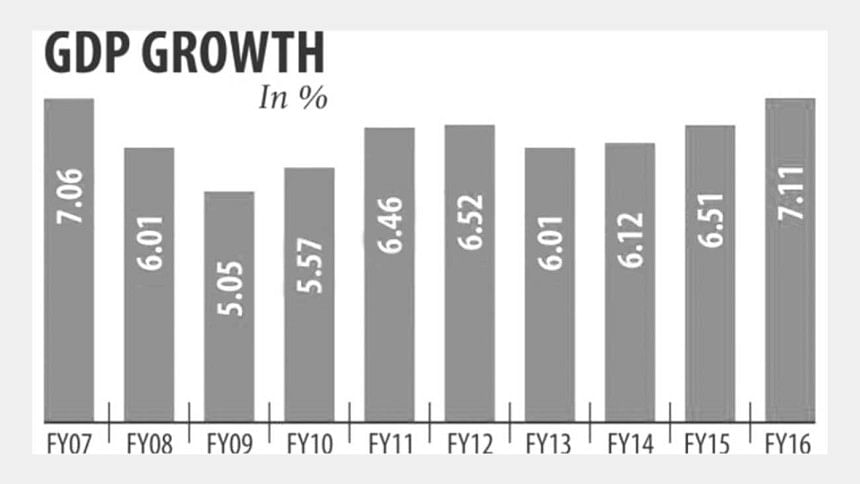Moving forward beyond 2017

GLOBALLY, 2016 has been an unprecedented year. Brexit, Trump, rise of populism, refugee crisis and terrorism will continue to define the political and economic scenario of the world in 2017. Inside the country, a number of positive as well as challenging developments will shape the dynamics of Bangladesh's journey in 2017. As most big economies are still struggling to recover from slow growth, Bangladesh's major economic boost will have to come from within the country.
Stability in Bangladesh, both economically and politically was strong in 2016. This has helped in achieving higher growth of gross domestic product that crossed 7 percent in fiscal year 2016. Industry played the main role in higher GDP followed by the services sector. Low petroleum prices in the global market helped inflation rates to stay low since Bangladesh spends a significant amount on petroleum products. Export earnings increased at a higher rate than imports and export-GDP ratio increased in FY2016 while import-GDP ratio declined. Higher export of readymade garments contributed to this growth. Bangladesh is eying at earning USD 50 billion through RMG exports by 2021. Given the potential of the sector and the compliance measures being undertaken for the last two years following the Rana Plaza incident, the sector can meet the target easily. Surely, improved infrastructural facilities, technological upgradation, skills development will facilitate the growth process of the sector.
Investment remains a crucial component of growth in Bangladesh as the major impetus for growth has to come from both public and private investment. In FY2016, investment as a share of GDP was 29.7 percent, lower than the target for the fiscal year. This was lower than the savings rate also, indicating the weakness in utilisation capacity of the economy. Keeping in mind the need for a growing economy, the government has targeted to increase investment to 32.7 percent of GDP in FY2017. This will require boosting investment efforts through infrastructure projects. Depressed economic performance in the oil exporting countries has led to a cut in remittance flow to the country despite increase in migrant workers. This is worrying since a major part of Bangladesh's foreign exchange is earned through remittances.
While macroeconomic indicators are better compared to many other countries, Bangladesh will have to focus on a number of issues that may hinder the growth momentum of the country. In 2016, the banking sector continued to display its weaknesses. Rise of non-performing loans, lower capital adequacy and the overall lack of governance in the sector are disturbing for the economy. Window dressing through rescheduling and restructuring of NPL and government support to the loss making banks cannot solve the problem unless stern measures are taken against malpractices and fraudulent cases. Cyber crime has emerged as a new phenomenon for the banking sector in Bangladesh that caused a reserve heist of USD 101 million from Bangladesh Bank. The investigation report on this hack has not been made public and the progress in getting the stolen money back is slow. Much activity on tackling cyber crimes has not been visible yet.
The most shocking incidence of 2016 has been the terrorist attack in Holey Artisan Bakery. The nature of the attack was different from earlier single incidences where religious militants killed members of minority groups, two foreigners and a number of bloggers. Holey attack was massive in scale when 20 people were killed, 17 of them were foreigners. After the Holey killings, there was a fear that foreigners would stop coming to Bangladesh and the economy may suffer. However, Bangladesh could tackle the situation very well by strengthening the security in the country. Bangladesh's partners have not turned away either. The visit of the Chinese President and his commitment to invest in Bangladesh, the assurance of continued cooperation from Japan, the visit of the World Bank President despite World Bank's cancellation of funding the Padma Bridge construction on corruption allegations, and international events such as the one on migration in Dhaka are indication of confidence in Bangladesh's approach towards terrorism and commitment for growth and prosperity.
In 2017, Bangladesh would continue to drive its ambitions for becoming a higher middle income country. The country will also prepare to come out of the least developed country status. These will require consolidation of its achievements and preparation for tackling further challenges. As the country received commitments for an investment of USD 24 billion from the Chinese government and in the process of implementing mega projects such as the Padma Bridge and the Ruppoor power plant a lot of clarity on their implications as regards debt-GDP ratio, quality and timeliness is required. Of course, debt-GDP ratio is not an imminent issue at the moment since debt-GDP ratio is relatively low for Bangladesh. However, once commitments of the Chinese money start to get into the economy and the Ruppoor power plant is implemented, debt-GDP ratio would increase significantly. The pressure on the debt situation could be accommodated through increasing efficiency in project implementation and accelerated revenue collection.
Bangladesh's economic and social achievements are widely acclaimed around the world. The challenge is now to make this sustainable and inclusive. Maintaining macroeconomic stability, increasing efficiency in project implementation as well as national earnings and improving governance are major issues that will have to be vigorously followed up in 2017. The economy is set to run on a high speed lane with objectives set to achieve 7.2 percent growth in FY 2017 and even higher in the coming years. This ambition is underpinned by continuous economic and political reforms.
The writer is Research Director at the Centre for Policy Dialogue.

 For all latest news, follow The Daily Star's Google News channel.
For all latest news, follow The Daily Star's Google News channel. 



Comments